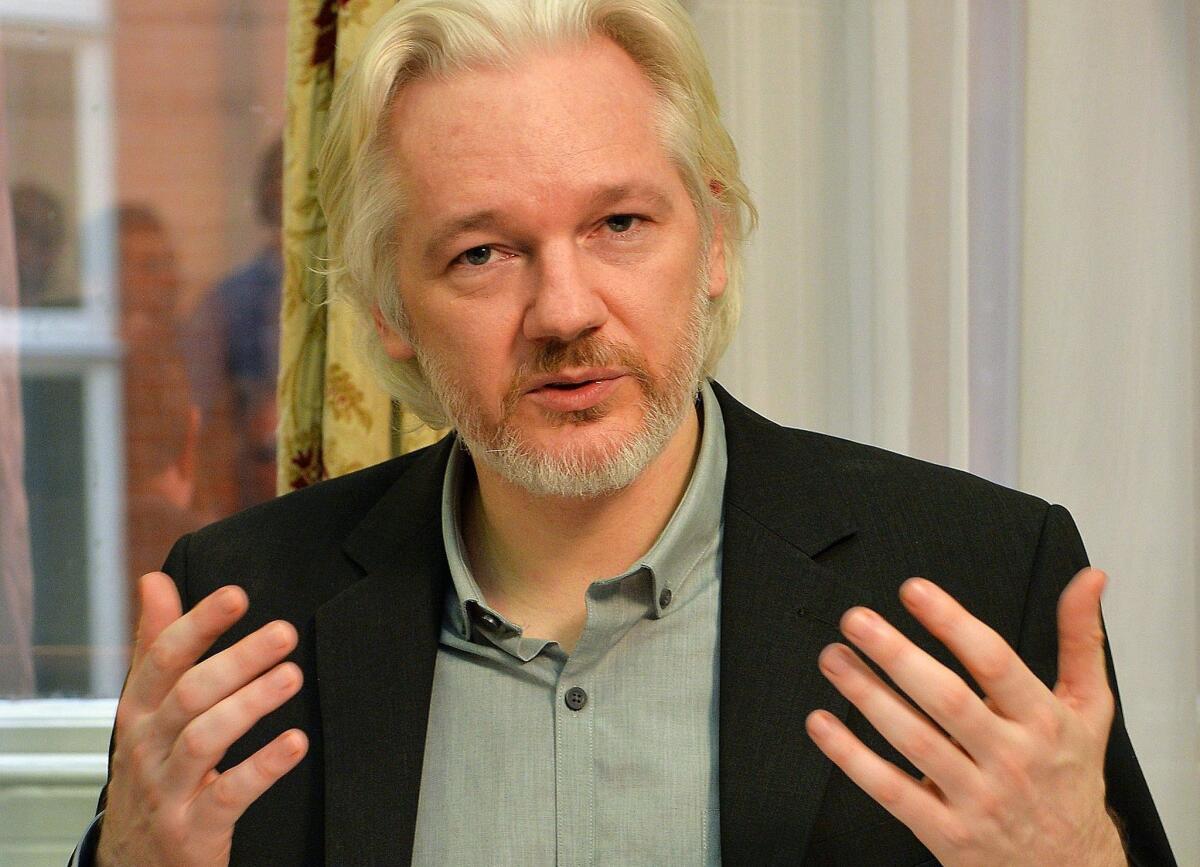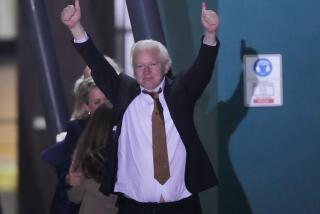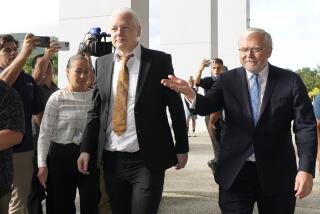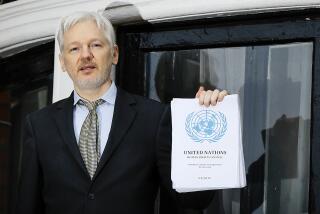Sweden bends in Julian Assange case, asks for interview in London

- Share via
Reporting from London — Swedish prosecutors have offered to fly to Britain to question Julian Assange over sexual assault accusations, a move that could end years of political and diplomatic deadlock.
A formal request was made Friday by Marianne Ny, who leads the team investigating the allegations against Assange, to interview the WikiLeaks founder in London and take a DNA sample.
Prosecutors previously insisted any meeting must take place on Swedish soil.
Assange has been holed up inside the Ecuadorean Embassy since June 2012 as he fights extradition to Sweden to face accusations by two women of rape and sexual molestation.
He vehemently denies the allegations and says he fears that if he travels to Sweden he would be extradited to the United States to face prosecution on espionage charges related to WikiLeaks’ release of hundreds of thousands of classified government documents.
Assange’s lawyers have repeatedly offered to let him be interviewed by Swedish prosecutors at the Ecuadorean Embassy, which has granted him political asylum, but those offers were rejected.
However in August the statute of limitations will run out on some of the lesser crimes he is accused of, which has seemingly forced the issue back to the fore.
“My attitude has been that the forms for a hearing with him at the embassy in London are such that the quality of the interrogation would be inadequate and that he needs to be present in Sweden at a trial. That assessment remains,” Ny said in a statement.
“Now time is running out and I therefore believe that I have to accept a loss of quality in the investigation and take the risk that the hearing will not take the investigation forward, because no other option is available as long as Assange does not make himself available in Sweden.”
Another factor leading to the change of tack is a decision handed down by Sweden’s Court of Appeal in November. The judge rejected Assange’s attempt to have the warrant for his arrest quashed but strongly criticized prosecutors for failing to move the case forward.
Assange has not yet been formally charged with a crime, a step that takes place later in the criminal process in Sweden. However, before it can be determined whether he can be charged, there needs to be a complete investigation, which includes interviewing him directly.
Assange was reportedly informed about the development on Friday morning.
His lawyers say he already gave a DNA sample when he was first arrested in 2010, but his Swedish lawyer, Per Samuelsson, still described the development as a “great victory.”
“We have been asking for this to happen for over four years,” Samuelsson said. “The only thing which is irritating is that it comes so late because it has kept Julian Assange in the embassy for over 2½ years now.”
Ny said the interview would be carried out by Ingrid Isgren, the deputy prosecutor in the case, and a police investigator.
If Assange’s lawyers agree to meet with the Swedish prosecutors, they will still need to seek approval from the British and Ecuadorean governments. They are unlikely to meet any obstacles because both countries have expressed support for such a move.
In Britain, especially, there has been uproar over Assange’s ongoing presence in the embassy after it was reported that keeping a 24-hour police presence around the site since June 2012 has cost British taxpayers $15 million so far.
“It is sucking our resources,” Metropolitan Police Commissioner Bernard Hogan-Howe said earlier this year.
Boyle is a special correspondent.
More to Read
Sign up for Essential California
The most important California stories and recommendations in your inbox every morning.
You may occasionally receive promotional content from the Los Angeles Times.










